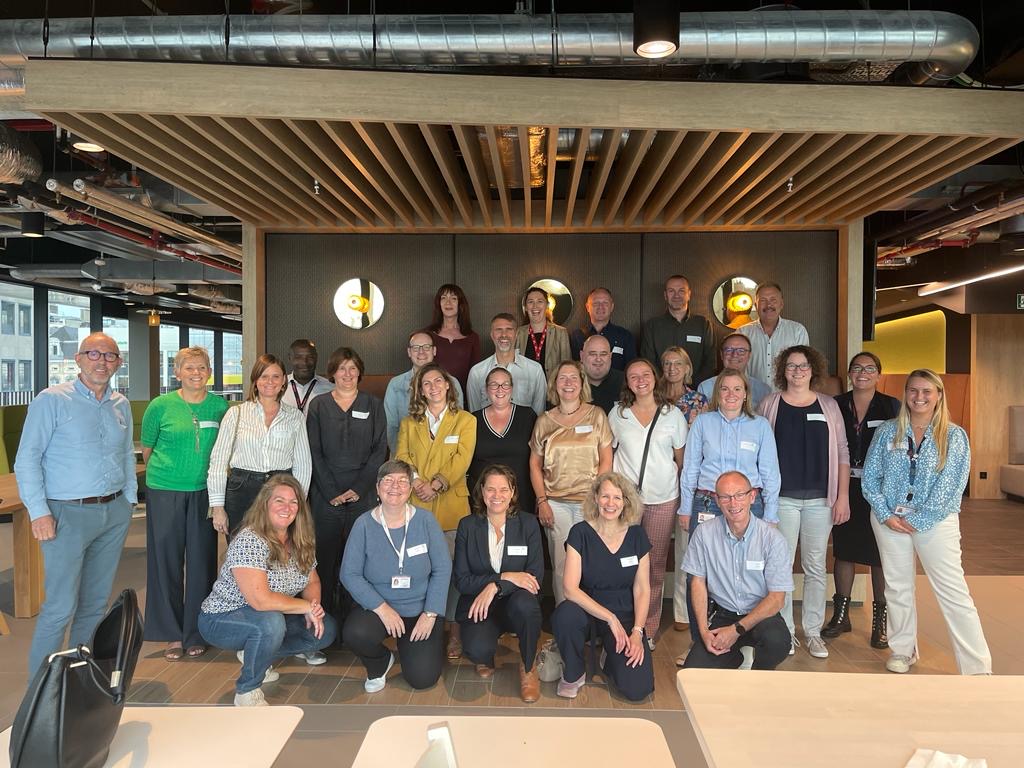Building Skills-Conscious Organizations
In this interview, we sat down with Christophe Vanden Eede, Global Head of Talent Management at bpostgroup. This is part of our ongoing interview series on the key differentiators that will require attention from everyone involved in Talent Acquisition in 2024. bpostgroup is Belgium’s leading postal operator and a major player in e-commerce logistics across Europe, North America, and Asia. With a workforce of 36,000, it delivers mail and parcels to millions of addresses and provides comprehensive e-commerce logistics services.
Together with Christophe, we delved into our first theme: skills as the new currency, and redefining organisational success beyond traditional metrics. With his passion for HR and transformation, Christophe shared his thoughts and experiences on moving organizations towards a more skills-driven approach.
About Cristophe

Christophe’s career can be characterized by a constant commitment to driving change. After completing his studies in law and general management, he began his professional journey at a leading Belgian energy company. There, he played a pivotal role in shifting the company’s focus from service delivery points to customer-centered solutions.
Gaining experience across departments, Christophe moved from marketing and sales to program and project management before taking up a position in HR. In this role, he contributed to enhancing employer branding and sourcing strategies, including the development of a state-of-the-art channel strategy for talent acquisition.
During this time, Christophe developed a strong interest in digital innovation, actively participating in projects aimed at advancing digital transformation efforts. His scope extended beyond Belgium to shape digital strategies across all European units. In subsequent career moves, he held roles of increasing responsibility, including Talent Acquisition and Development Director within the telecommunications sector and Global Head of Talent Management in banking. Christophe recently took up the position of Global Head of Talent Management at bpostgroup.
Skills-based organizations are a hot topic in our field at the moment, but it is not always a given that everyone works from the same assumptions. To start off, it would be great if you could share your understanding of a skillsbased approach, be it in talent acquisition or talent management?
Yes, sure. I think it’s important as HR professionals that we are very clear in the different definitions and that we know what we are talking about. That allows us to bring the story of skills and their benefits to our different stakeholders in order to gauge their interest and support. I would start at the level of capabilities, which are qualities possessed by an organization, not an individual. For instance, as an organization, you need to specify certain leadership capabilities, and then you can put in place different approaches to develop those capabilities.
Next, you have competencies. These are specific skills and behaviors linked to particular roles or functions within an organization. Traditionally, HR practices have heavily relied on competencies for recruitment, talent management, and learning initiatives. However, as organizations become more flexible and dynamic, rigid competency-based approaches may no longer suffice. With the increasing need for agility and adaptability in today’s organizations, skills play a crucial role. Unlike competencies, skills are less context-dependent and more granular, reflecting the abilities an individual has acquired from previous experiences. Embracing a more skills-based approach allows HR to offer further personalized development opportunities, better suited to the evolving needs of both employees and the organization in today’s dynamic workplace.
How do you assess the implications for HR when adopting a skills-based approach?
This transition will have significant implications across various HR processes. One major impact is changes to the criteria on which we select and assess candidates during the recruitment process. How do you define the skills portfolio necessary for the position – not just for today, but for the future needs of the organization? It also necessitates a reevaluation of reward structures. Currently, rewards are often tied to specific job functions and associated competencies. However, in a skillsbased approach, rewards should reflect an individual’s market value – which is tied to their skills, rather than solely based on job deliverables.
Many HR professionals are hesitant to embrace this change due to the extensive overhaul required in existing HR processes, such as performance management and reward systems. Despite the challenges, rethinking HR processes presents an opportunity for innovation and improved alignment with evolving organizational needs. Many companies are beginning to pair their explorations of skills-based approaches in learning and other HR domains with great advancements in technology, particularly in AI.
Great headway to my next question. Given your experience with digital transformations, what is your takeaway on the current state of HR technology in the area of skills-based management?
 While many have attempted to address this challenge, no body has cracked the code yet – at least in my humble opinion. However, the ongoing advancements in HR technology offer new possibilities for progress. AI’s capacity to swiftly analyze extensive data sets in real-time means it could potentially deliver personalized feedback based on individual contexts and skills.
While many have attempted to address this challenge, no body has cracked the code yet – at least in my humble opinion. However, the ongoing advancements in HR technology offer new possibilities for progress. AI’s capacity to swiftly analyze extensive data sets in real-time means it could potentially deliver personalized feedback based on individual contexts and skills.
I am in continuous discussions with providers, with the aim of identifying a solution for my current employer that will support our skills-based approach. To give you an idea, we have some 4,000 competencies in our competency model, where everything has been written down manually and validated by the management. There’s no way to expand that to 35,000 skills and continue to work manually – it’s far too much work for everyone. A solution powered by AI will streamline this process in an effective and compelling way.
To add to this, it’s a mistake to expect employees to scroll through 35,000 skills to discern and validate their skill profiles in order to access tailored learning and development content. This approach is likely to result in a lack of support for your organizational mission.
AI’s capacity to swiftly analyze extensive data sets in real-time holds the promise of delivering personalized feedback based on individual contexts and skills.
Can you share some insights into the approach your organization is taking towards skills-based management?
Absolutely. One important lesson I learned from my past experiences is to always start by identifying a business problem. There is a lot of hype around HR and skill-based organizations, which can lead to a rush to implement solutions without first understanding if they’re actually necessary. At bpostgroup, we’ve recognized the importance of adopting a skillsbased approach, particularly in light of our workforce composition and the challenges we face in our industry.
We’ve been experimenting with this approach for several years, driven by the need to address specific business problems, rather than simply jumping on the skills bandwagon. It’s crucial for us to align our talent strategy – from hiring to development – with the challenges we encounter, such as the potential need to find solutions for a significant portion of our workforce as business re-focuses. This means carefully assessing the skills landscape within our organization and leveraging that insight to drive targeted interventions and solutions.
We engage in discussions per department to define the roles we’re aiming for and the specific skills required to excel in those positions.
How do you determine which skills are essential for different roles within your organization?
Identifying crucial skills for various roles involves a collaborative effort between HR and departmental management. We engage in discussions per department to define the roles we’re aiming for and the specific skills required to excel in those positions. This process includes considering both current needs and future trends, to ensure we’re not only addressing immediate challenges, but also preparing for upcoming changes in the industry.
Additionally, we conduct assessments to gauge employees’ current skill levels and identify any gaps that need to be addressed, whether through training or other interventions, or bought from the external market.
There has been a lot of discussion around seeing skills as the new currency, and the decrease in focus on formal degrees in hiring decisions. What is your view on this approach?
I believe that the skills, competencies, and knowledge gained through education or experience have a short shelf life, and so it does not make sense to focus on someone’s diplomas or degrees if they were obtained a decade ago. However, this may vary depending on the job – if you are looking for a nuclear engineer, it is safe to assume that an engineering degree is still a prerequisite.
To make decisions regarding hiring or promotions, assessments and interviews remain crucial in order to validate that the person has the necessary skills and knowledge for the role. However, it is important to remember that people’s skills are always evolving, so a candidate’s attitude and ability to learn are just as important as their current skillset. It is often said that you should hire for attitude and train for skill. I agree with this but starting from scratch is not always an option, so basic skills must still be present, in addition to the capacity to develop other important skills. This approach will ensure you hire the right person for a long-term career in the organization.
 Could you provide some examples of how you’re addressing skills gaps within your workforce?
Could you provide some examples of how you’re addressing skills gaps within your workforce?
Certainly. One approach we’re taking is to offer targeted training and development opportunities to employees based on their identified skill gaps, be it during the recruitment or development process. For instance, we provide courses to improve literacy and numeracy skills for those who may struggle in those areas. Additionally, we offer programs to help employees obtain secondary school diplomas or improve their language proficiency, recognizing the importance of these skills for long-term career success. By investing in our employees’ skill development, we not only enhance their individual capabilities, but also strengthen our organization as a whole.
How do you measure the effectiveness of your skills-based approach to talent management?
We track various metrics related to employee performance, retention, and overall organizational success. The fact that we’re at the beginning of the transformation makes this difficult, but in the future, I expect we’ll also look at factors such as productivity, job satisfaction, and career progression to gauge the impact of our interventions. We also conduct regular assessments and feedback sessions to gather insights from employees themselves about their skill development and career aspirations. While some outcomes may take time to materialize, such as improved retention rates or enhanced organizational agility, we remain committed to evaluating our success and making adjustments as needed.
Interview by Annett Zippel
 Annett specializes in executive search and leadership advisory within the life sciences industry. She works with biotech, pharmaceutical, and healthcare companies to build strong leadership teams that drive innovation and growth. With a deep understanding of industry dynamics, she helps organizations navigate change, align talent with strategy, and foster high-performing teams. Passionate about connecting people and ideas, Annett is committed to shaping the future of life sciences through impactful leadership.
Annett specializes in executive search and leadership advisory within the life sciences industry. She works with biotech, pharmaceutical, and healthcare companies to build strong leadership teams that drive innovation and growth. With a deep understanding of industry dynamics, she helps organizations navigate change, align talent with strategy, and foster high-performing teams. Passionate about connecting people and ideas, Annett is committed to shaping the future of life sciences through impactful leadership.



